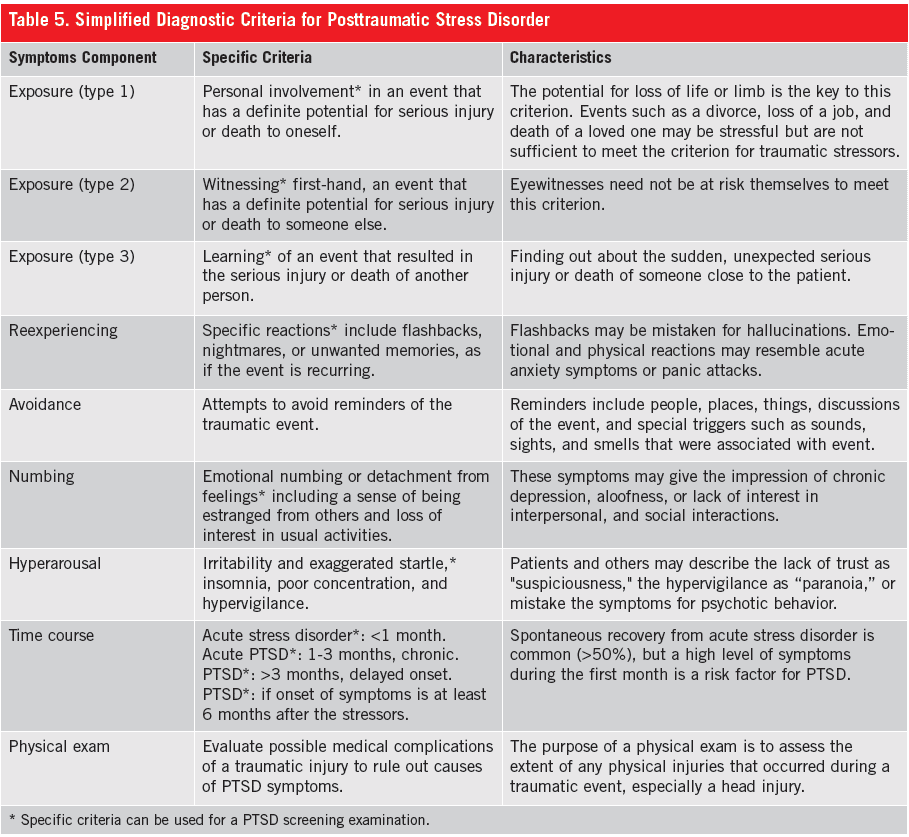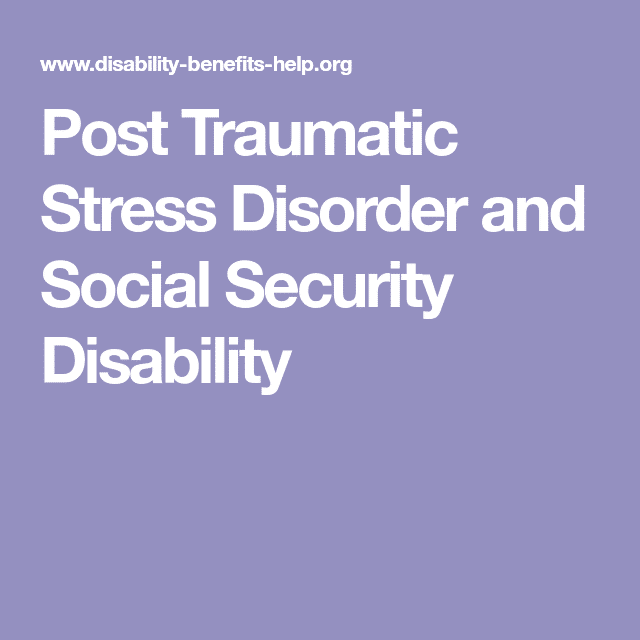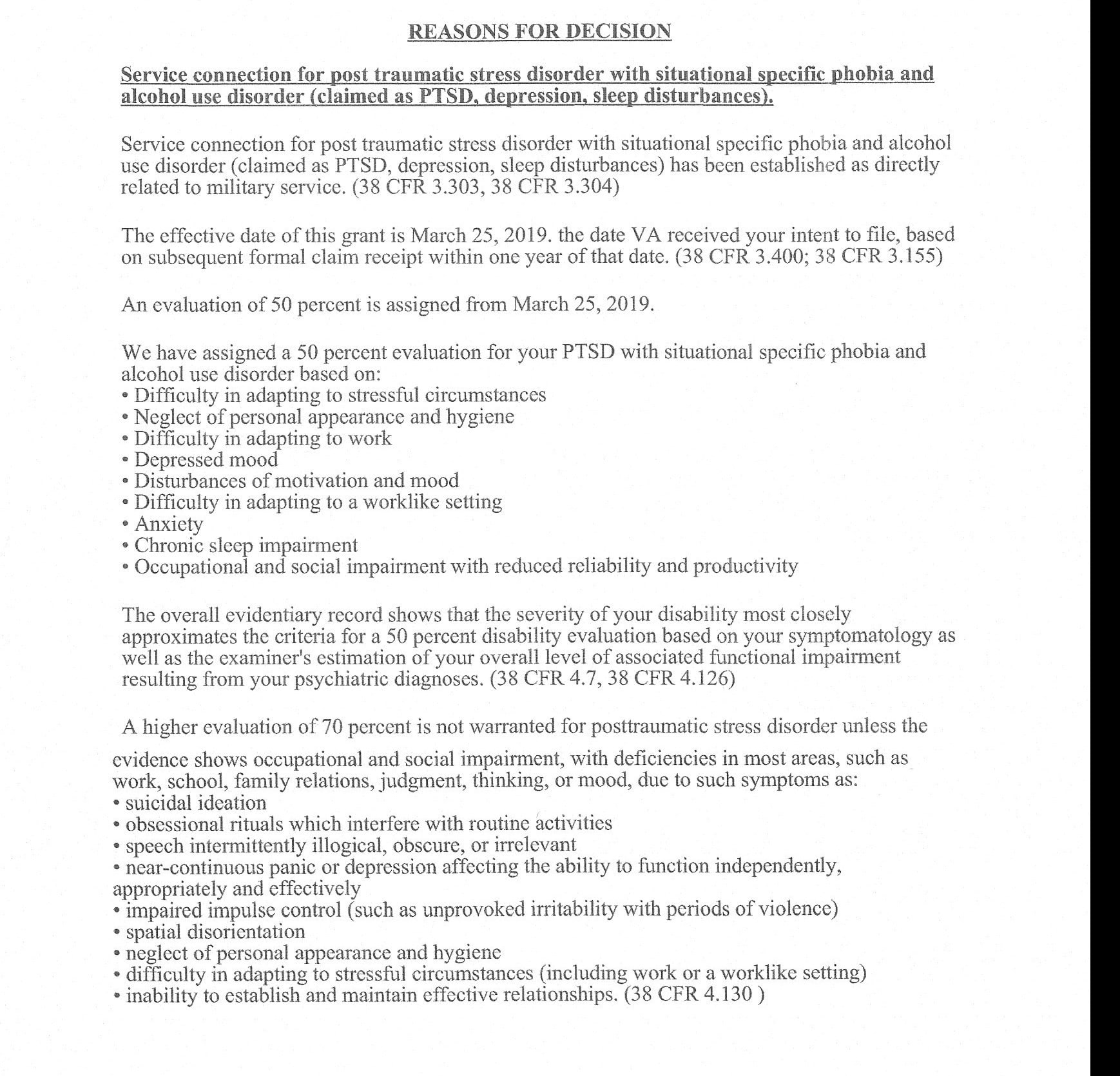The Schedular Requirements Are That:
- The Veteran has one service-connected disability rated at least 60 percent disabling OR
- The Veteran has more than one service-connected disability, with one condition rated at least 40 percent, and a combined rating of at least 70 percent. For example, a Veteran may qualify for TDIU based on VA ratings for PTSD or TBI and for depression considered a secondary disability proximately due to PTSD or TBI.
What If A Veteran Exhibits Symptoms Of Two Ptsd Ratings
Where two evaluations may apply, the VA must grant the higher evaluation if the disability picture is closer to that higher rating. Otherwise, the VA will assign the lower rating. If a veteran fits criteria for both the 50% and 70% ratings, the VA should grant the 70 percent rating.
Similarly, there is the issue of IU and PTSD. If a veteran has a 70% PTSD rating and does not meet the 100% rating, his PTSD could cause IU. If that is the case, then the VA should grant 100% through IU for the PTSD.
Symptoms that the VA considers when rating PTSD include, but are not limited to:
- impairment in thought processes or communication
- grossly inappropriate behavior
The Va Applies Its Ratings System For Psychological Conditions As Follows:
At the 100% rating, a veteran receives the maximum amount of disability pay, which is $3,332.06 per month as of 2022. However it is important to understand that the VA doesnt just add up the percentages for multiple conditions. For this reason, VA ratings of 100% are not easy to obtain even with claims for multiple disabilities. In some cases Individual Unemployability may be an option to receive benefits equal to those of a 100% rating without actually raising your rating. This can be especially effective for VA ratings of 70%.
Don’t Miss: Can You Collect Long Term Disability And Social Security
Va Unemployability For Depression
Keep in mind that the VA may give out a low disability rating or deny the claim to start out. However, this should not dissuade a veteran from applying for disability compensation. If a veteran has a mental condition that is linked to the military, the veteran should always pursue the claim. If the claim is denied or if the rating given is too low, the veteran can always appeal.
If you have a service-connected mood disorder and you cannot work, then you can apply for individual unemployability . Unemployability can be awarded for one disability or for several different ones. PTSD by itself can cause unemployability due to PTSD symptoms of angry outbursts, isolation, and inability to get along with others.
A 100% Rating Requires:

Total occupational and social impairment, due to such symptoms as: gross impairment in thought processes or communication persistent delusions or hallucinations grossly inappropriate behavior persistent danger of hurting self or others intermittent inability to perform activities of daily living disorientation to time or place memory loss for names of close relatives, own occupation, or own name.
In addition, a Veteran who has been rated below 100 percent for depression may still be entitled to a Total Disability rating based on Individual Unemployability, or TDIU.
Veterans unable to obtain and maintain gainful employment due to service-connected conditions can qualify for TDIU.
A Veteran may qualify for TDIU according to the disability ratings schedule or on an extra-schedular basis.
Recommended Reading: Do You Pay Income Tax On Long Term Disability Canada
Seeking Immediate Help Help
First, if you or a Veteran you know is currently experiencing symptoms that include suicidal thoughts, thoughts of self-harm, or thoughts of harming others, waiting may not be an option.
- if you or someone you know is in immediate crisis.
There are immediate avenues that can also be pursued.
- Veterans Crisis Hotline at 1-800-273-8255
- local community crisis centers and referrals are available through any crisis hotline
- your local hospital
- Your local VA Service center
How Is Depression Treated
There are many treatment options for depression. You should be assessed by a healthcare professional who can decide which type of treatment is best for you. In many cases, milder forms of depression are treated by counseling or therapy. More severe depression is treated with medicines or with both therapy and medicine.
Research has shown that certain types of therapy and medicine are effective for both depression and PTSD. Since the symptoms of PTSD and depression can overlap, treatment that helps with PTSD may also result in improvement of depression. Cognitive behavioral therapy is a type of therapy that is proven effective for both problems. CBT can help patients change negative styles of thinking and acting that can lead to both depression and PTSD. A type of medicine that is effective for both depression and PTSD is a selective serotonin reuptake inhibitor . See Treatment Basics for more information.
Also Check: Do Veterans Widows Get Benefits
What The Va Does During A Re
A PTSD review examination is almost identical to the Compensation and Pension examination that you underwent when you first applied for PTSD. The examiner will be focused on learning the current severity of your symptoms and whether they have remained the same, improved, or worsened.
Only certain health care providers can re-evaluate for PTSD. They can be a board-certified or eligible psychiatrist, a licensed doctorate level psychologist, a doctorate level mental health provider who works under close supervision of a board-certified or eligible psychiatrist or licensed doctorate level psychologist, a psychiatry resident under close supervision of a board-certified or eligible psychiatrist or licensed doctorate level psychologist, a licensed clinical social worker, a nurse practitioner, a clinical nurse specialist, or physicians assistant under close supervision of a board-certified or eligible psychiatrist or licensed doctorate level psychologist.
The re-evaluation of your PTSD should include the following:
Do Veterans Have To File Separate Va Claims For Depression And Anxiety
Importantly, VA recognizes that veterans are not qualified psychological experts. Therefore, it is unreasonable to expect veterans to be certain of their exact mental health diagnosis. Veterans can only attest to their symptomatology and how it affects them on a daily basis. Clemons v. Shinseki held that a service connection claim for one psychiatric condition must be considered a claim for any psychiatric condition that may be reasonably raised by several factors . In other words, if there are other psychological diagnoses on record, VA is required to consider whether those diagnoses are related to a veterans service even if the veteran did not specifically file claims for those conditions. In short, veterans do not have to file separate VA claims for depression and anxiety.
Don’t Miss: Can I Work On Disability
Common Ways Depression And Anxiety Can Be Related To Military Service
Importantly, in-service causes of depression and anxiety do not have to be due to a military activity. Rather, the cause merely needs to have happened during service. Oftentimes veterans are experiencing problems not directly related to the military that still affect their functioning during service. For example, if a veteran is deployed to another country and they are experiencing problems with their family at home, they might become depressed and anxious over their inability to be with their family while stationed abroad. Again, as long as the factors causing the veterans symptomatology, or the symptomatology itself, manifested during service, they are eligible for service connection.
% Depression Va Claim Rating
This is the highest VA disability rating, and it means that the veteran is considered to be fully disabled. They are not capable of functioning in work or social settings. The symptoms are similar to those discussed in the lower percentage ratings, but they tend to be more severe. They may have impaired thoughts and trouble communicating. They may have memory issues, trouble performing common daily functions, and they could suffer from delusions depending on their diagnosis. At this stage, there is a chance that the patient is a danger to themselves and others.
Recommended Reading: How Long Does It Take To Get Disability For Copd
Negative Changes In Beliefs Thinking Or Mood
Traumatic events cause us to view the world and the people in it differently. You may find it difficult to get close to people or have positive feelings about others . Some examples of negative changes might include:
- Feeling hopeless or emotionally numb about the present and future
- Feeling detached from loved ones
- Mild memory loss
- Lack of attention to personal appearance/minimal personal hygiene
- Suicidal ideation
Number Receiving Disability Benefits For Mental Disorders Increasing

Since 2000, the number of veterans receiving disability benefits has doubled from 2.3 million to 4.5 million in 2015.
Veterans disability benefits for PTSD are the third most common approved benefit type. Learn what evidence can show PTSD or depression are service-connected, and how to document its impact on your life.
Many service members may be reluctant to seek Veterans disability benefits treatment for mental health issues. This may be because they worry it will affect their ability to advance in the military it can also be due to the VAs history of not recognizing mental health conditions, and/or underrating the disability they can cause.
You May Like: How Does Your Disability Affect You
Military Sexual Trauma And Other Non
Weve been talking about combat stressors, but non-combat stressors can also cause PTSD. Non-combat stressors include robberies, domestic violence, and sexual assault essentially any in-service event that caused you to fear for life or limb. These incidents occur all too frequently, but the link to PTSD is less well established.
In the past, PTSD related to Military Sexual Trauma was particularly hard to prove. Incidents of MST were swept under the rug by commanding officers, while Dont Ask, Dont Tell prevented the victims of same-sex MST from reporting crimes out of fear of losing their jobs. Recent media scrutiny has alerted the public to the prevalence of sexual violence in the military, which has led to more cases being reported. In 2012 the VA acknowledged the difficulty of corroborating MST claims and relaxed evidentiary standards, leading to a 20% increase in successful MST-related PSTD claims. Proving PTSD due to a non-combat stressor presents its own unique challenges, but dont be deterred. The absence of service records is not valid grounds to deny a PTSD claim, nor is a veterans failure to report at the time out of fear.
The short answer is: Yes. You are entitled to veterans disability benefits for MST if it caused you to develop PTSD.
How PTSD is Rated by the VA
A 10% ratings means you have an occasional decrease in productivity at work due to transient PTSD symptoms, but only during periods of significant stress.
Getting to 100% with Related Conditions
Depression And Heart Disease: Other Va Studies
Mental disorders and heart attack riskâBy examining the health histories of more than 350,000 Veterans over a seven-year period, researchers from the St. Louis VA Medical Center reported, in 2010, that those with depression are at about 40 percent higher risk than others for having a heart attack.
General anxiety and panic disorder seem to raise the risk to a similar extent, and posttraumatic stress disorder also raises the riskâbut to a lesser degree. Researchers are continuing to study whether treating these mental disorders reduces heart risk.
Vascular depressionâIn a follow-up study, whose results were published in 2012, researchers found that those who had depression in middle age were at an increased risk of developing vascular depression in old age, and that their mid-life depression could be a causal risk factor.
Ischemic heart diseaseâIn 2014, researchers at the VA Puget Sound Health Care System reported that Veterans with depression are more likely to complain of increased chest pain related to ischemic heart disease.
Ischemia is a condition in which blood flow, and therefore oxygen, is restricted or reduced in a part of the body. Ischemic heart disease, also known as coronary artery disease, is the term given to heart problems caused by narrowed heart arteries.
Recommended Reading: Is Having One Kidney Considered A Disability
How To File A Va Claim For Ptsd And Depression
If you think you deserve a higher VA rating for PTSD and Depression, you may want to read How to File a Claim for PTSD by clicking HERE.
Do you need more medical evidence to prove VA Service Connection?
Become an Insider
Were Veterans helping Veterans Worldwide, and since 2016 weve helped 10,000+ Veterans just like you INCREASE their VA disability rating!
Va Proposes Changing Disability Ratings For Mental Health Other Conditions
The Department of Veterans Affairs is considering changes to its disability rating system for some conditions to bring it in line with modern medicine, the agency announced.
The proposed changes were posted to the Federal Register on Tuesday. They focus on ratings for respiratory conditions, as well as mental health and ear, nose and throat disorders. In some cases, such as with mental health, asthma and chronic obstructive pulmonary disease, the changes would lessen the requirements that veterans need to meet to receive a 100% disability rating.
The changes are part of a larger effort, started in 2017, to make the entire disability rating system more up to date, the department said. VA Secretary Denis McDonough said Wednesday during a news conference that the system was first developed in 1945 and has hardly changed since.
Were in the process of modernizing the schedule to account for todays understanding of diseases and treatments to ensure that veterans getting the ratings, and therefore the care and benefits, deserved, he said.
The amendments, if approved, will not lead to any reductions in disability ratings for veterans who are already receiving compensation. However, those veterans can apply for an increase if they think the changes mean they could secure higher ratings, the agency said.
You May Like: Is Substance Abuse A Va Disability
What Is The Va Disability Rating For Depression
The VA rates all mental health disorders under the General Rating Formula for Mental Disorders in the Schedule for Rating Disabilities. This includes all types of depression and PTSD.
The ratings can be 0%, 10%, 30%, 50%, 70%, or 100%.
A 0% rating is given when a veteran has a formal diagnosis of a mental health disorder, but symptoms are not severe enough to require continuous medication or do not interfere with daily work or social life.
A 100% rating is given when a veteran has total occupational and social impairment due to a mental health disorder.
Secondary Service Connection For Depression
In some cases, a veteran may qualify for VA disability for depression if the depression is the result of another condition connected to the service, otherwise known as a secondary claim.
Lets say that you were injured while in the military.
And years later youre still dealing with this pain, which has caused a list of additional problems in your life.
Eventually, triggering depression.
This is sometimes referred to as a Lifestyle Impact Claim and/or Somatic Symptom Disorder .
In addition, depression could also cause or aggravateanother disability.
For example, the medication that you are taking may have the side effect of another injury or condition.
You must still prove this connection through medical evidence to create the link and show the correlation.
Recommended Reading: How To Get Short Term Disability From Work
How Can A Va Disability Lawyer Help Obtain Va Benefits For Depression
As Veterans who serve Veterans, the attorneys at Berry Law Firm recognize that depression is a serious medical condition that can cause Veterans significant disruption in their daily lives and relationships. Veterans with clinical depression suffer from damaging effects on their social and family life and to their ability to make a living. We recognize the need for Veterans to obtain treatment for depression and other psychological conditions brought on by military service or related causes.
At Berry Law Firm, we stand ready to help you appeal denied VA disability claims in order to seek access to the resources that you need to fight depression. We represent Veterans with mental health impairments in VA disability appeals nationwide. Our efforts to protect the rights of disabled Veterans have helped established new VA law to support Veterans. If you have been denied VA disability compensation for depression or your disability rating is too low, we will use our knowledge of the appeals process experience to help you receive a fair and thorough review of your denied claim or inappropriate disability rating.
Va Disability Rating For Depression: Recognized Mood Disorders

Before getting too deep into the VA disability rating for depression, it is important to understand how the condition is characterized.
According to the VA, depression is considered to be a mood disorder, and they recognize two different types of depression under this category.
These include major depressive disorder and dysthymic disorder. Lets take a closer look at these two types of depression.
Read Also: Grants For Veterans With Ptsd
Understanding The Va Rating For Ptsd
The VA assesses both depression and PTSD based on how much the condition causes occupational and social impairment.
When discussing VA disability ratings for mental conditions, its helpful to understand the ratings for post-traumatic stress disorder as well. PTSD is a psychiatric disorder that generally follows a traumatic event, such as combat and violent acts. It can often cause severe symptoms like panic attacks, reactive behavior, intrusive thoughts, and even mild memory loss related to the event. Depression can also be a symptom of this condition, but the VA focuses on PTSD as a whole when determining a disability rating.
Since these symptoms can interfere with daily life, some veterans will pursue a benefits claim. Similar to their ratings for depression, the VA assesses PTSD based on how much the condition causes occupational and social impairment.
